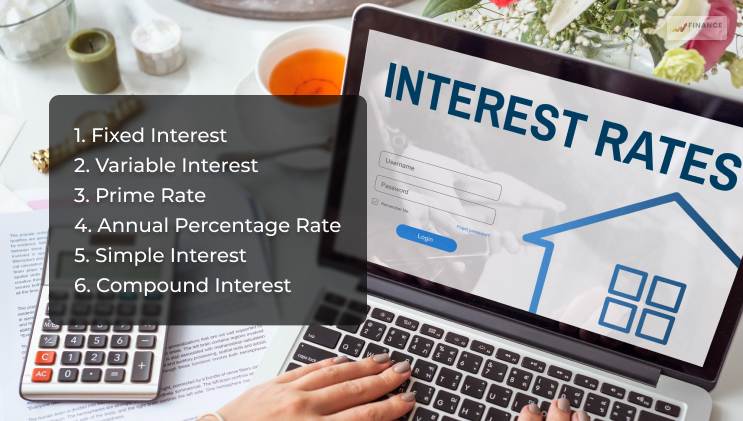- What Is Interest?
- 1. Fixed Interest
- 2. Variable Interest
- 3. Prime Rate
- 4. APR or Annual Percentage Rate
- 5. Simple Interest
- 6. Compound Interest
- What Is Capitalization?
- What Increases Your Total Loan Balance?
- 1. Delay In Repaying The Loan
- 2. Opting For An Extended Payment
- 3. Paying Lesser Than The Requested Amount
- 4. Deferring Or Missing Payments
- 5. Federal Income-Driven Plans
- 6. Errors
- Final Verdict
What Increases Your Total Loan Balance?

It is usual to take a loan when you are having financial troubles or you can not afford a hefty amount all at once. The reason can be anything from higher studies, starting a business, getting a car, or a new house.
Taking a loan is basically borrowing money from financial institutions like banks and repaying that amount within a particular time period, along with interest. The calculation is pretty much simple.
You take a loan of X amount at an interest rate of Y% for a time period of Z months. That means, at the time when you are taking the loan, you get to know how much you need to pay back to your lender.
But, there are some instances when this calculation is not in the proper place.
In that case, your loan balance can go up.
I know you might be facing something like that, and that is why you are searching for “what increases your total loan balance?”
So, when you are searching here and there to find out, “what increases my total loan balance?” Here, I am ready to help you with the answer.
What Is Interest?
If you have taken any loan or used the credit, you definitely know about interest. Still, here I am providing a more detailed guide.
Interest basically refers to the lender’s rate for loans that are given to businesses, individuals, or groups. If you are an investor, this amount of money you are earning for your savings in financial institutions.
Here, I would like to mention that different financial institutions charge different interest rates on loans to individuals, student loans, along with any other type of loans. However, while imposing a particular interest rate, all financial institutions are bound to follow regulations that are provided by the Federal Reserve.
So basically, you see, there are different types of interests, and every one of them has a different impact on the total loan amount that you are required to pay back.

So, when you want to know the answer to the question, “what increases total loan balance?” You have to have a proper understanding of different types of interests.
1. Fixed Interest
Well, fixed interest is pretty much simple and straightforward to understand. Fixed interest is a particular amount of money you need to pay apart from the actual loan amount that you have borrowed.
As the name suggests, fixed interest never gets changed. That means it doesn’t matter if you are taking a loan in 2022 and are thinking about repaying it by 2024, as the interest rate will be the same. Usually, most of the short-time loans come with fixed interest rates.
2. Variable Interest
Now comes the variable interest. And as the very name is saying, it is like the opposite of fixed interest, and here the borrower needs to pay interest on the basis of the market value that is set by the bank or any other lending institution.
Here, I want you to know that most loans that are first disbursed before 1st July 2006 have variable interest rates. But Perkins Loans are exceptions.
3. Prime Rate
It is a particular type of interest which lending institutions or banks provide to their favored customers for the loan that they are borrowing. Compared to some other interests, usually, this particular type of interest is lower.
4. APR or Annual Percentage Rate
If you are using any credit card, your credit card company is charging you with APR. Here the total amount of interest is calculated on the basis of the total cost of your lean on an annual basis.
Now, for calculating annual percentages, there are mainly two formulas that banks or financial institutions follow. Here they are.
5. Simple Interest
Also called regular interest. Here the lenders or banks charge a rate for the loans for the entire period of the loan term. I know, although it names simple interests, it is a little complicated to understand.
So, let’s take an example. Suppose you have taken a loan with a simple interest of 5%, and the period is 3 years. Now, the lender will make the calculation by multiplying the interest with the principal and then again multiplying the result with a 3 years period.
6. Compound Interest
When your bank is charging you compound interest, the interest and principal increase with time because the accrued interest is added back to the, and it is being added before calculating the new interest for the next repayment.
These are the most common interest types that banks and other lending institutions across the globe use. Apart from these options, a lot of lenders also use discount and prime rates on the basis of the lender;’s preference.
What Is Capitalization?
In order to find out the answer to “what increases your total loan balance?” You also need to know about capitalization along with the different types of interests.
I have already covered the interesting part, so it is time to dig into what capitalization is.
It typically refers to the addition of unpaid interest amounts to the actual principal loan balance. When you fail to make the loan payment or have postponed it, it typically increases your principal loan balance.

In case you have enrolled in school, you do not have to pay anything towards your student loan for at least six months after you leave. However, this is only applicable to subsidize loans only.
And in case you have unsubsidized federal loans, you still need to experience accrued interests during the mentioned period when you have started repaying.
What Increases Your Total Loan Balance?
Now, you have got the necessary information that you should know in order to understand the answer to the ultimate question, “what increases your total loan balance?” that you have in your mind now.
Usually, a lot of factors work together and also individually when it comes to “what increases your total loan balance?” Here, we will talk about them.
It is really common that each and every borrower would want to pay a small interest on the loan amount they are taking, and it depends on the rate that the bank or any other lender applied on loan along with the type of interest you need to pay on your loan agreement.
Here are some of the most common factors that can usually make your total loan balance higher.
1. Delay In Repaying The Loan
Lenders or banks obviously have a punishment for non-payment or defaulted loans. It means when you have taken a loan, and you are failing to pay it back in proper time or are simply not able to make a repayment, they will always charge a hefty amount as a penalty.
This will automatically affect your credit scores in a negative way.

This is not the end, though. Suppose you are a student and have taken a federal student loan. Now, by the time you will graduate to a particular point, you will be able to repay the loan. However, it might take more time than indicated in the agreement.
Here, if you make a delay in repayment, your loan balances might go up. That’s why in case you are thinking that “what increases my total loan balance?” it can be because you are making a delay in repaying the amount.
2. Opting For An Extended Payment
You might opt for a longer repayment period over a short one. It has both advantages and disadvantages. An extended or longer payment plan might reduce your monthly payments to a smaller amount over a long period, but you will not feel any more impact on the loan repayment.

In case you choose a longer repayment option, you will notice that by the time you have completed your repayments, you have paid more than you would be paying if you had chosen the short-period loan option.
The major advantage of a short-period loan is that you will finish the loan repayment earlier and will also need to pay less.
3. Paying Lesser Than The Requested Amount
When you are paying less than the requested amount, which also leads to a more loan balance, which will automatically reflect on your overall repayment, let’s understand this with an example.
Suppose you have taken a loan, and you are supposed to pay 10% interest, but you end up paying 5% on the first year and also the principal payments. Now, the remaining 5% interest that you haven’t paid will be added to the principal amount of your loan.

That means the next year, your principal will be more, and as your principal is more, you will also need to pay more as interest. So, if you are thinking about paying less than what you are supposed to pay, think twice; it will make you pay more the next time.
4. Deferring Or Missing Payments
Just the way delaying payments can cost you more, deferring or missing your payment or not making a payment at the right time also can impact the total loan amount that you are eventually paying.
Obviously, banks or lenders are not going to take any risk. So, when you are missing a repayment, they will penalize you unless it is a student loan. And it is because you have collateral security for the particular loan that you have taken.

As a result, you also can lose the asset that you have provided as the security of the loan.
5. Federal Income-Driven Plans
Federal income-driven plans are some specific repayment plans which are pretty affordable for the borrower to repay the loan as it considers the income of the borrower. It mostly affects student loans along with others, which consider the family size and income of the individual.
The lenders consider the income in this particular type of repayment plan. And as a result, the repayment is most likely to be less, making the loan balance go up. You will find 4 types of income-driven repayment plans that are described as follows.
- Pay As You Earn Plan or PAYE Plan.
- IBR Or Revised Income-Based Repayment Plan.
- REPAYE or Revised Pay As You Earn Plan.
- IRC or Income Contingent Repayment Plan.
All of these plans typically depend on the income of the narrower and are also calculated differently. But, I would also like to add that all these plans are not that focused on ensuring that you are clearing your loan fast. .

Rather these are typically based on your income and set the monthly minimum payments as less as possible. So, it is obvious that it will affect your entire loan debt and also the loan balance. .
So, when you are thinking, “what increases your total loan balance?” it is because you have opted for an income-based repayment plan. In addition to all these, you will also lose your rights under the federal loan programs in case you opt to consolidate with a private loan lender.
This is the reason why I would ask borrowers to generally maximize their federal loan options prior to restoring private loans.
6. Errors
It is really common to have algorithmic errors, which might make your loan balance go up. All these calculation errors can take place due to confusion. So, when you are seeing a rise in your loan balance, which is there for no reason from your side, it is crucial to talk to your lender.
You should check whether there are any miscalculations which are affecting your total loan balance. Apart from that, all those credit monitoring services provide a lot of benefits when it comes to disputing any type of errors with your credit cards, and monitoring your credit report and credit accounts.
All credit reporting agencies keep your balance information updated with credit card issues in order to keep collection calls at bay. You just need to ensure that you are making on-time payments on a regular basis to help prevent errors.
Final Verdict
So you see, there are several things that work together and also separately when it comes to “what increases your total loan balance?” That means you need to take care of the things I have mentioned above in order to keep those extra payments for your loan at bay.
Read Also:










